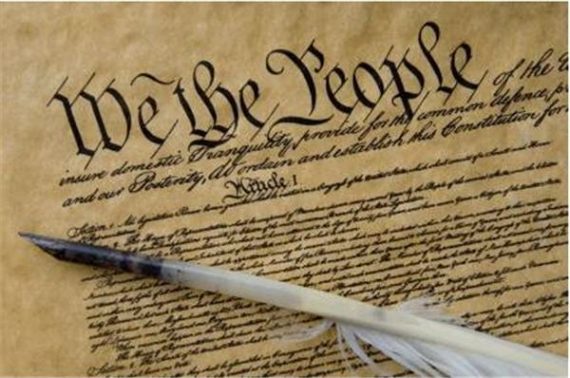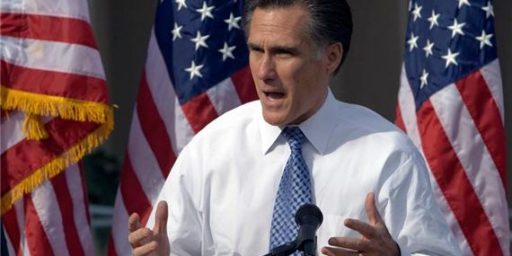The Unspoken Hope of Critics of the Seventeenth Amendment
Why would policy outcomes be different under the 17th Amendment?
 My OTB colleague, Doug Mataconis, has posted on the ongoing discussion of the Seventeenth Amendment.
My OTB colleague, Doug Mataconis, has posted on the ongoing discussion of the Seventeenth Amendment.
In that post he hits on what I see as the hope of the repealers:
Returning to indirect election of Senators *might* have a positive impact, but that will only happen if the Senators elected have a proper understanding of their role under the Constitution, and if the state legislators appointing them have that same understanding.
Not to be the grumpy contrarian, but I would argue that all this means is a hope (and I use that word quite specifically) that certain policy outcomes would occur if Senators were appointed rather than elected. There is an underlying assumption that “a proper understanding” of the Senate’s constitutional role will be a more conservative type of policy outcome. For example, the assumption is that appointed Senators would be more prone to adopt a more stringent interpretation of the Tenth Amendment. More to the point, the hope is clearly that appointed Senators would be less willing to vote for social spending and have an expansive view of the Commerce Clause.
However, it is wholly unclear to me why this would be the case (save for the aforementioned hope). Why, for example, would a Senators appointed by the state legislature of New York be radically different in behavior than a Senator elected by the citizens of New York? Yes, I would expect some differences, simply because the mechanism of selection and job retention would create different incentive structures.
This is part of what I was getting at the other day when I asked if one could separate the interests of a state from the interests of the population of that state. However, the assumption that a Democrat (for example), appointed by a Democratic state legislature would behave differently than an elected Democrat is problematic. Do people really think that the basic goals of Democratic politicians are radically different because they are in state legislatures? Where is the basis to assume that an appointed Democrat, who believes in social spending and welfare programs, will all of a sudden eschew such policies?
I can take the argument that perhaps (and I will only allow a perhaps) that appointed Senators might be prone to be more concerned by unfunded mandates to the states, but not necessarily.
Further, people seem to be forgetting that appointed Senators still would serve 6 year terms—meaning that they would not be as directly accountable to the legislators are some assume. A six-year leash creates more independence, especially when state legislatures typically have four-year terms.
Where, for that matter, is the evidence that Senators in the pre-17th Amendment Era were subservient to state legislatures?
The bottom line question is this: why do proponents (and granted, this is hardly the stuff of a massive movement) think that the overall policy direction of the US would be radically different if Senators were appointed? Yes, by definition, some policies outcomes would vary, but what so many still seem not to understand is that the move towards social welfare policies is much more an artifact of the Industrial Revolution and the radical changes that come from it than because we lost our way by electing Senators.






Steven,
Facts have no place in discussions of matters of faith.
I tend to agree. If you have appointed senators who are subject to immediate recall, then you might see some different behavior. Not so much on policy preferences but rather their implementation. In some ways it could make things more costly. For instance, the result is not that “unfunded mandates” will no longer be mandated, but rather that they will now be funded at the federal rather that state level, increasing rather than decreasing federal tax-and-spend.
The author has a fundamental misunderstanding of why the Founders set up the Senate and the indirect election of Senators to begin with….
Its called “State’s Rights”…..
Since the States were the prinicpal agents who established the Constitution and Union, the Senate was the body that would be represenative of their interests…..the House would be the people’s direct represenative…..
Yes, Senators would be much more interested in fighting the many Mandates and bad laws that hamper the ability of various states to operate their governments/socities effectively.
Not to mention hamper the States ability to collect and use tax revenues generated within their own state.
It would make no sense for a state to play the “rob from your neighbor” earmark game currently being played; the incentive would be to end high federal taxation and spending
In short, direct election promotes centralization and nationalization of politics and power while indirect election represents a restoration of balance in the Federalist system.
I am going to have to state that I find it a bit difficult to be lectured to about the meaning of institutional arrangements by a guy who calls himself Wylie E. Coytoe [sic?].
🙂
I think that the house members should be electec by popular vote, but that the senators should be elected by a different system– everyone votes in their respective senate elections, but each vote is weighted in proportion to the net personal wealth of the voter. For instance if Roger has a net worth (assets-liabilities) of $100,000.00, then he casts 100,000 votes. If Lamont has a personal net worth of $25,000.00, then he casts 25,000 votes
The difference is in who the Senators have to pander to. It’s entirely fair to say that state legislators would be more inclined to reward somebody who gives more power to their state government, rather than somebody who gives more money directly to the people. The opposite is true for the direct election of Senators.
Basically, repealing the 17th amendment would mean that rather than the federal government spending money directly on the people, it’ll all be funneled through the state legislatures so that they can get credit for the hand-outs, direct it to their supporters, and generally increase their own importance.
I doubt, however, that the same would happen for taxation, especially when the state’s man (or woman) in Washington can press for more federal taxes in order to fund state spending.
@Since the States were the principal agents who established the Constitution
Absolutely, freaking wrong:
We the People of the United States, in Order to form a more perfect Union, establish Justice, insure domestic Tranquility, provide for the common defence,[1] promote the general Welfare, and secure the Blessings of Liberty to ourselves and our Posterity, do ordain and establish this Constitution for the United States of America.
Pre-17th weren’t most states having what were considered “de facto” popular election of Senators?
“As a result of such developments, at least 29 States by 1912, one year before ratification, were nominating Senators on a popular basis, and, as a consequence, the constitutional discretion of the legislatures had been reduced to little more than that retained by presidential electors.”
http://caselaw.lp.findlaw.com/data/constitution/amendment17/
In my state, I would say repealing the 17th amendment would make no difference since a “de facto” system would be reinstated.
Um Sam, the “People” did not vote on the Constitution. The State legislatures ratified the Constitution. The States created the General Government and are the principles.
The ability to recall and replace a Senator was a vital aspect of the original system set up by the Constitution. The House of Representatives represented the people of the States and the Senate represented the States.
Actually, the constitution was ratified by conventions at the state level (see Article VII). Indeed, Article VII bypassed the amendment process laid down in the Articles that would have required the state legislatures to ratify (see Article XII of the Articles). Indeed, if the Articles had been followed to the letter, unanimity of said legislatures would have been required.
This fact, by the way, undercuts your argument about the states being the principles. Were that the case, the state governments would have had the right to accept or reject the constitution, and yet the state governments were consciously by-passed by the process. Further, unanimity was not needed for the formation of the US government, rather only 9 of 13 was required.
I would note, in passing, the Federalist Papers are not addressed to the government of the state of New York, but rather to the people of that state.
Thanks for the clarification. Each state did indeed have a ratification Convention…an important fact I misrepresented. In fact, the delegates to the 1787 convention were sent to amend the Articles of Confederation, but they quickly turned to formulating the U.S. Constitution when the Virgina Plan was introduced. This is why they bypassed the Articles of Confederation amendment process (without authority?). Electing delegates to the State ratification committees was desinged to keep the process as politics free as possible (if even possible) and implement the will of the people of each State. That is not to say that none of the delegates were elected members of their state legislatures.
The States (not necessarily the legislature) are still the principle by the fact that the people of the State (delegates) were responsible for ratification. This arguement is of course a philosophical one, but important and grounded in accepted truths. Our republic is founded on the principles of Natural Law and the Delclaraion of Indpendence clearly states that we all have unalienable rights to life, liberty, and pursit of happiness (property). We do not get our rights from our rulers, we get them from God (or as a result of our humanity if you aren’t religious). As such, the people are the only legitimate Sovereign. All governors (in the generic sense) are agents and servents of their creators (the People). They shall only exercise authorities delegated and are always responsible to the People for the manner in which they perform or neglect these authorities. This why I argue that the General Government is an agent of the States (or the people of the States). Just like the local and State governments are agents of the people. Again, not collective National “people,” but the people of the several states.
On our contient, the people formed colonies and delegated powers to them for governance. In general, the King allowed self-government from the time of initial colonization until King George began to abuse his power and infringe on the rights of the people of the colonies in the mid-eighteenth century. Virginia was the first colony to declare independence in May of 1776. By that fact, Virginia had formed their own sovereign and independent body politic called a State. We all know that in July of 1776, the other colonies had declared themselves also sovereign and independent. The People of each of the colonies revolted, not the People of the collective colonies. The U.S. Constitution was ratified by several acts (eventually 13 seperate acts), not one act. The principles of the Declaration of Independence do not dissolve because the U.S. Constitution was created.
Certainly, the States became subordinate to the General Government in all areas delegated under the U.S. Constitution. In all other areas, all authority was retained. In all cases, the people retain sovereignty as the master of all government. They delegate authority, they do no lose it. At any point those authorities are abused or misused, they may take said authority back.
Last point on the Federalist Papers is noted. Its significance as to the common understading of the Constituion is still invaluable today. While not binding, they do provide the context as to the purpose and scope of the Constitution.
Ultimately, however, the states themselves are agents of the people, and therefore not the ultimate principles.
However, as noted, your argument would have more force if, in fact. the governments of the states had had the right and power to acquiesce to the Constitution or not. The entire Article VII maneuver, from using conventions to the gambit of requiring only 9 of 13 ratifications to allow formation of the government, was all about, as I have argued from the beginning, the subordination of the states to the central government.
I would argue that what you are arguing is far more about the proper interpretation of how federalism should function/how you think it was designed to function (given that it ended up not working the way you want it to have worked) than it is a rebuttal of my initial claim, which is that a fundamental purpose/result of the Constitution of 1789 was to subordinate the states to the federal government. I have never meant that statement to mean, by the way, that the federal government, therefore, has plenary power to do whatever it wants to do. But the question of what they can do and why (and whether they should or not) is the argument you really want to have. Fair enough.
True, the States are the agents of the people in State matters. In State/General Government relations, the States are the principles. We’ll have to disagree as to the purpose of the 1787 Constitution. Nothing in history suggests its purpose was to subordinate the States to the General Government. It would not have been accepted by any State if that were the case. The purpose was to make necessary changes to strengthen the General Government in certain areas to make the Union more likely to succeed. It may be that I simply misunderstand your position.
I am arguing about the nature of our republic and our from of republicanism. What I have argued is the form of government that was understood and ratified in 1787. Unless the Constitution itself changes the form of government via an Amendment, it cannot change. There are a few Amendments that fundamentally change the method, in general the form of government has been changed by the General Government without the consent of the people of the States. Why should we accept what is and what is supposed to be? Why should we accept the courts changing the form of government or the executive legislating?
The States absolutely had the power to accept or reject the Constitution. If you are claiming that the States HAD to eventually ratify the Constitution, that is entirely incorrect. In fact, Rhode Island did not ratify the Constitution until 1790. Once once States ratified the Constitution, the Article of Confederation were not longer in effect. The States who had not ratified the Constitution were simply not subject to its provisions or protections. They were free and independent states. Joining the Union was voluntary.
I meant to say “Once nine states ratified the Constitution…” in the bottom paragraph.